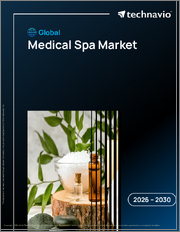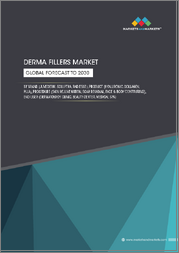
|
시장보고서
상품코드
1716291
스파 관리용 SaaS 시장 예측(-2032년) : 기능별, 전개 형태별, 최종사용자별, 지역별 세계 분석SaaS for Spa Management Market Forecasts to 2032 - Global Analysis By Function, Deployment Mode, End User and By Geography |
||||||
Stratistics MRC에 따르면, 스파 관리용 SaaS 세계 시장은 2025년에 3억 661만 달러로 예측 기간 동안 13.7%의 CAGR로 성장하여 2032년에는 7억 5,321만 달러에 달할 것으로 예상됩니다.
서비스형 스파 관리 소프트웨어(SaaS)는 업무 효율성 향상, 업무 최적화, 고객 경험 향상을 위한 클라우드 기반 솔루션을 제공합니다. 이러한 플랫폼은 자동 마케팅 기능, POS(Point of Sale) 통합, 온라인 예약, 예약 스케줄링, 고객관계관리(CRM), 재고 추적 등 다양한 도구를 제공합니다. 스파 소유자는 SaaS를 활용하여 직원 스케줄링을 최적화하고, 실시간 데이터에 액세스하고, 디지털 기록 및 자동 알림을 통해 고객과의 상호 작용을 맞춤화할 수 있습니다.
국제 스파 협회(ISPA)에 따르면, 미국 스파 산업은 2022년에 큰 성장을 이룰 것이라고 합니다. 스파 이용자 수는 2021년 1억 7,300만 명에서 2022년 1억 8,100만 명으로 증가하고, 1회당 매출은 7달러 상승한 111.50달러로 사상 최고치를 기록할 것으로 예상됩니다.
디지털 전환에 대한 니즈 증가
스파 및 웰니스 시설들은 고객 만족도와 운영 효율성을 높이기 위해 디지털 솔루션을 도입하고 있습니다. 전통적인 POS 기술, 종이 기록, 수동 예약 시스템은 구식이 되어가고 있으며, 실시간 동기화, 자동화, 데이터베이스의 중앙 집중화를 제공하는 클라우드 기반 플랫폼이 선호되고 있습니다. 또한, 직원 배치 최적화, 고객 선호도 관리, 빠른 예약 스케줄링, 관리 부담 및 인적 오류 감소의 필요성이 디지털화로의 전환을 촉진하고 있습니다.
도입 초기에는 저항이 컸다
새로운 디지털 솔루션의 도입은 많은 스파 소유자, 특히 소규모 또는 전통적 비즈니스를 운영하는 스파 소유자들에 의해 저항을 받습니다. 이러한 저항은 수작업 프로세스에 대한 의존, 기술 지식의 부족, 변화에 대한 두려움으로 인해 발생하는 경우가 많습니다. 클라우드 기반 시스템은 온프레미스 및 종이 기반 소프트웨어에서 전환할 때 압도적으로 보일 수 있으며, 이는 일부 기업이 도입을 미루거나 피하는 이유가 되기도 합니다. 또한, 직원들이 새로운 플랫폼을 이해하고 사용법을 익히기 위해서는 집중적인 교육이 필요할 수 있으며, 이는 초기 비용과 다운타임을 증가시키는 요인이 될 수 있습니다.
스파 및 웰니스 부문의 성장
휴식, 자기관리, 정신건강에 대한 관심이 높아지면서 세계 웰니스 분야는 크게 성장하고 있으며, SaaS 제공업체들은 웰니스 휴양지, 럭셔리 스파, 메디컬 스파 등 스파 서비스에 대한 수요가 증가함에 따라 이익을 얻을 수 있는 좋은 기회를 맞이하고 있습니다. 기회를 포착하고 있습니다. 기업들은 서비스 제공 개선, 증가하는 고객 관리, 업무 간소화를 위해 자동화된 솔루션을 찾고 있습니다. 또한, 클라우드 기반 스파 관리 플랫폼은 업계가 성장함에 따라 확산될 것으로 예상되며, 공급업체는 더 많은 고객에게 서비스를 제공할 수 있는 기회를 얻게 될 것입니다.
사이버 보안과 데이터 유출 위험성
SaaS 기반 플랫폼에서는 고객 및 기업의 개인정보를 클라우드에 저장하기 때문에 데이터 유출, 랜섬웨어, 해킹, 사이버 공격 등이 발생할 수 있습니다. 결제 기록, 병력, 고객의 개인정보 등 개인 데이터를 다루기 때문에 스파는 사이버 공격에 취약합니다. 또한, 고객의 신뢰가 손상되고, 규제 당국으로부터 벌금을 부과받을 수 있으며, SaaS 제공업체와 해당 소프트웨어를 사용하는 스파 사업자는 보안 침해의 결과로 막대한 재정적 손실을 입을 수 있습니다. 변화하는 사이버 보안 위협에 대응하고 데이터 보호법을 준수하는 것은 결코 쉬운 일이 아닙니다.
COVID-19의 영향:
COVID-19 팬데믹은 스파 관리용 SaaS 시장에 두 가지 영향을 미쳤습니다. 스파 기업들은 일시적인 휴업, 매출 손실, 영업 중단 및 사회적 거리두기로 인한 고객 감소를 경험했고, 그 결과 SaaS 제공업체들은 구독 취소로 인해 재정적 부담을 안게 되었습니다. 그러나 이 분야가 새로운 정상에 적응하면서 온라인 결제, 가상 상담, 비접촉식 예약, 자동 고객 관리 등의 수요가 급증했습니다. 또한, 운영 제한 관리, 위생 규정 준수, 고객과의 원격 대화 등의 디지털 솔루션에 대한 스파의 요구로 인해 클라우드 기반 스파 관리 플랫폼이 채택되었습니다.
예측 기간 동안 예약 및 스케줄링 분야가 가장 큰 비중을 차지할 것으로 예상됩니다.
예측 기간 동안 예약 및 스케줄링 분야가 가장 큰 시장 점유율을 차지할 것으로 예상됩니다. 스파에 있어 효과적인 예약 스케줄링은 생산성 극대화, 수작업으로 인한 오류율 감소, 고객 만족도 향상에 필수적입니다. 온라인 예약, 모바일 예약 앱, AI를 활용한 예약 리마인더의 보급으로 스파는 노쇼 감소, 수익 최적화, 워크플로우 간소화를 위해 SaaS 플랫폼에 대한 의존도를 높이고 있습니다. 또한, 실시간 가용성 업데이트, 자동 확인, 직원 캘린더 동기화 등 통합 스케줄링 솔루션을 통해 효율적인 운영을 보장할 수 있습니다. 또한, 반복 예약, 다중 지점 예약, 고객 셀프서비스 포털 등의 기능도 채택을 촉진하고 있습니다.
예측 기간 동안 가장 높은 CAGR을 보이는 것은 클라우드 기반 부문입니다.
예측 기간 동안 클라우드 기반 부문이 가장 높은 성장률을 보일 것으로 예상됩니다. 클라우드 기반 솔루션은 온프레미스 시스템에는 없는 유연성과 확장성을 제공함으로써 스파 비즈니스가 장소에 구애받지 않고 운영할 수 있게 해줍니다. 클라우드 기반 플랫폼은 재고 추적, 자동화된 고객 참여, 실시간 예약 스케줄링, 안전한 데이터 저장 등의 기능을 통해 IT 인프라 비용을 절감하고 업무 효율성을 향상시킵니다. 클라우드 솔루션으로의 전환은 모바일 애플리케이션과 AI를 활용한 자동화의 확대, 데이터 보안 및 컴플라이언스에 대한 관심 증가로 인해 더욱 가속화되고 있습니다. 또한, 구독 기반 가격 책정 모델을 통해 중소규모의 스파에서도 이러한 플랫폼을 도입할 수 있게 되어 보급이 확대되고 있습니다.
가장 큰 점유율을 차지하는 지역:
예측 기간 동안 북미가 가장 큰 시장 점유율을 차지할 것으로 예상됩니다. 이 지역에는 고객 만족과 운영 효율성을 중시하는 스파, 살롱, 웰니스 센터가 많기 때문에 클라우드 기반 AI 기반 스파 관리 소프트웨어에 대한 수요가 높습니다. 또한, 온라인 예약, 셀프 케어, 가처분 소득의 증가로 인해 SaaS 솔루션의 채택이 가속화되고 있습니다. 북미의 우위는 최고 수준의 SaaS 제공업체의 존재와 자동 스케줄링, 영업 인력 통합, 인공지능을 통한 분석 등 지속적인 기술 개발로 인해 더욱 강화되고 있습니다.
CAGR이 가장 높은 지역:
아시아태평양은 예측 기간 동안 가장 높은 CAGR을 보일 것으로 예상됩니다. 중국, 인도, 일본, 한국 등의 스파 기업들은 생산성과 고객과의 상호작용을 향상시키기 위해 클라우드 기반 관리 시스템을 도입하는 움직임이 가속화되고 있으며, 스마트폰의 보급과 인터넷 연결의 증가, 온라인 예약 및 디지털 결제에 대한 선호도가 높아짐에 따라 SaaS 기반 스파 솔루션에 대한 수요는 더욱 가속화될 것으로 보입니다. 온라인 예약 및 디지털 결제에 대한 선호도가 높아짐에 따라 더욱 가속화되고 있습니다. 고급 스파 체인의 성장과 웰니스 여행을 장려하는 정부 프로그램도 시장 확대에 힘을 보태고 있습니다. 또한, 아시아태평양은 저렴한 가격의 구독 기반 SaaS 모델, 이 지역의 중산층 확대, 디지털 자동화에 대한 인식 증가로 인해 가장 빠르게 성장하는 시장으로 부상하고 있습니다.
무료 커스터마이징 서비스:
본 보고서를 구독하는 고객은 다음과 같은 무료 맞춤화 옵션 중 하나를 이용할 수 있습니다:
- 기업 소개
- 추가 시장 기업 종합 프로파일링(최대 3개사까지)
- 주요 기업 SWOT 분석(3개사까지)
- 지역 세분화
- 고객의 관심에 따른 주요 국가별 시장 추정, 예측, CAGR(주: 타당성 검토에 따른)
- 경쟁사 벤치마킹
- 제품 포트폴리오, 지리적 입지, 전략적 제휴를 기반으로 한 주요 기업 벤치마킹
목차
제1장 주요 요약
제2장 서문
- 개요
- 이해관계자
- 조사 범위
- 조사 방법
- 데이터 마이닝
- 데이터 분석
- 데이터 검증
- 조사 접근법
- 조사 자료
- 1차 조사 자료
- 2차 조사 정보 출처
- 가정
제3장 시장 동향 분석
- 성장 촉진요인
- 성장 억제요인
- 기회
- 위협
- 최종사용자 분석
- 신흥 시장
- COVID-19의 영향
제4장 Porter's Five Forces 분석
- 공급 기업의 교섭력
- 구매자의 교섭력
- 대체품의 위협
- 신규 참여업체의 위협
- 경쟁 기업 간의 경쟁 관계
제5장 세계의 스파 관리용 SaaS 시장 : 기능별
- 예약과 스케줄
- 재고 관리
- 직원 관리
- 분석과 보고
- 마케팅과 캠페인
- 지불과 청구 관리
- 고객관계관리(CRM)
- 기타 기능
제6장 세계의 스파 관리용 SaaS 시장 : 전개 형태별
- 클라우드 기반
- 온프레미스
- 하이브리드 솔루션
제7장 세계의 스파 관리용 SaaS 시장 : 최종사용자별
- 데이 스파
- 메디컬 스파
- 리조트와 호텔 스파
- 모바일 스파
제8장 세계의 스파 관리용 SaaS 시장 : 지역별
- 북미
- 미국
- 캐나다
- 멕시코
- 유럽
- 독일
- 영국
- 이탈리아
- 프랑스
- 스페인
- 기타 유럽
- 아시아태평양
- 일본
- 중국
- 인도
- 호주
- 뉴질랜드
- 한국
- 기타 아시아태평양
- 남미
- 아르헨티나
- 브라질
- 칠레
- 기타 남미
- 중동 및 아프리카
- 사우디아라비아
- 아랍에미리트
- 카타르
- 남아프리카공화국
- 기타 중동 및 아프리카
제9장 주요 발전
- 계약, 파트너십, 협업, 합작투자
- 인수와 합병
- 신제품 발매
- 사업 확대
- 기타 주요 전략
제10장 기업 개요
- Mindbody Inc
- Rosy Salon Software
- Aesthetics Pro
- Zenoti
- Fresha.com SV Ltd
- Vagaro
- Mangomint
- SimpleSpa
- Boulevard
- Treatwell
- Meevo
According to Stratistics MRC, the Global SaaS for Spa Management Market is accounted for $306.61 million in 2025 and is expected to reach $753.21 million by 2032 growing at a CAGR of 13.7% during the forecast period. Spa management software as a service (SaaS) provides a cloud-based solution that increases business efficiency, optimizes operations, and improves customer experience. These platforms offer a wide range of tools, such as automated marketing features, point-of-sale (POS) integration, online booking, appointment scheduling, customer relationship management (CRM), and inventory tracking. Spa owners can optimize staff scheduling, access real-time data, and customize client interactions with digital records and automated reminders by utilizing SaaS.
According to the International SPA Association (ISPA), the U.S. spa industry experienced significant growth in 2022. The number of spa visits increased from 173 million in 2021 to 181 million in 2022, with revenue per visit rising by $7 to reach $111.50, an all-time high.
Market Dynamics:
Driver:
Growing need for digital transformation
Spas and wellness facilities are adopting digital solutions to boost customer satisfaction and operational effectiveness. Traditional POS techniques, paper records, and manual booking systems are becoming outdated in favor of cloud-based platforms that provide real-time synchronization, automation, and centralized databases. Moreover, the need to optimize staff allocation, manage client preferences, and expedite appointment scheduling while lowering administrative burden and human error is what is driving the shift toward digitalization.
Restraint:
High adoption resistance at inception
The adoption of new digital solutions is resisted by many spa owners, particularly those running small or conventional businesses. This reluctance is frequently brought on by a dependence on manual processes, a lack of technical knowledge, or a fear of change. A cloud-based system can seem overwhelming when switching from on-premises or paper-based software, which is why some businesses put off or avoid adoption. Additionally, employee comprehension and proficiency with the new platform may also necessitate intensive training, which would raise initial expenses and operational downtime.
Opportunity:
Growth of the spa and wellness sector
As more people place a higher priority on relaxation, self-care, and mental health, the global wellness sector is expanding significantly. SaaS providers have a great chance to profit from the growing demand for spa services, such as wellness retreats, luxury spas, and medical spas. Companies are increasingly searching for automated solutions to improve service delivery, manage their expanding clientele, and streamline operations. Furthermore, cloud-based spa management platforms are anticipated to become more popular as the industry grows, giving vendors the chance to serve a wider clientele.
Threat:
Risks to cyber security and data breach
Data breaches, ransom ware, hacking, and cyber attacks are all possible with SaaS-based platforms because they store private client and company information on the cloud. Due to their handling of private data, including payment records, medical histories, and client personal information, spas are susceptible to cyber attacks. Moreover, customer trust could be damaged, regulatory fines could result, and the SaaS provider and the spa businesses using the software could suffer large financial losses as a result of a security breach. Keeping up with changing cyber security threats and making sure data protection laws are followed are never easy tasks.
Covid-19 Impact:
The COVID-19 pandemic affected the SaaS for Spa Management Market in two ways: first, it caused disruptions, and then it accelerated the digital transformation. Spa companies experienced temporary closures, revenue losses, and decreased customer foot traffic during lockdowns and social distancing regulations, which resulted in subscription cancellations and financial strain for SaaS providers. But as the sector adjusted to the new normal, there was a sharp increase in demand for online payments, virtual consultations, contactless reservations, and automated client management. Additionally, cloud-based spa management platforms were adopted as a result of spas' desire for digital solutions to manage occupancy limits, adhere to hygiene regulations, and interact with clients remotely.
The booking & scheduling segment is expected to be the largest during the forecast period
The booking & scheduling segment is expected to account for the largest market share during the forecast period. Effective appointment scheduling is essential for spas to maximize productivity, lower manual error rates, and improve client satisfaction. Spas are depending increasingly on SaaS platforms to reduce no-shows, optimize revenue, and streamline workflows as a result of the growing popularity of online booking, mobile scheduling apps, and AI-powered appointment reminders. Furthermore, real-time availability updates, automated confirmations, and staff calendar synchronization are all provided by integrated scheduling solutions, which guarantee efficient operations. Features like recurring appointments, multi-location scheduling, and customer self-service portals also encourage adoption.
The cloud-based segment is expected to have the highest CAGR during the forecast period
Over the forecast period, the cloud-based segment is predicted to witness the highest growth rate. With the flexibility and scalability that on-premise systems cannot provide, cloud-based solutions allow spa businesses to run their operations from any location. Cloud-based platforms improve operational efficiency while lowering IT infrastructure costs with features like inventory tracking, automated customer engagement, real-time appointment scheduling, and secure data storage. The trend toward cloud solutions has also been accelerated by the growing use of mobile applications and AI-driven automation, as well as by the increased focus on data security and compliance. Additionally, small and medium-sized spas can now afford these platforms owing to subscription-based pricing models, which increase their uptake.
Region with largest share:
During the forecast period, the North America region is expected to hold the largest market share. Cloud-based and AI-driven spa management software is in high demand in the region due to the abundance of spas, salons, and wellness centers that place a high priority on customer satisfaction and operational effectiveness. Furthermore, the growing popularity of online booking, self-care, and disposable income has all contributed to the acceleration of SaaS solution adoption. North America's dominance is further reinforced by the existence of top SaaS providers and ongoing technological developments like automated scheduling, Sales force integrations, and analytics driven by artificial intelligence.
Region with highest CAGR:
Over the forecast period, the Asia Pacific region is anticipated to exhibit the highest CAGR. Spa companies are increasingly implementing cloud-based management systems in nations like China, India, Japan, and South Korea in an effort to increase productivity and client interaction. The demand for SaaS-based spa solutions is being further accelerated by the increasing use of smart phones and internet connectivity, as well as the growing inclination for online reservations and digital payments. The growth of luxury spa chains and government programs encouraging wellness travel also supports market expansion. Moreover, Asia-Pacific is the fastest-growing market due to the affordability of subscription-based SaaS models, the region's expanding middle class, and rising awareness of digital automation.
Key players in the market
Some of the key players in SaaS for Spa Management Market include Mindbody Inc, Rosy Salon Software, Aesthetics Pro, Zenoti, Fresha.com SV Ltd, Vagaro, Mangomint, SimpleSpa, Boulevard, Treatwell and Meevo.
Key Developments:
In January 2025, Vagaro announced that they have strategically acquired Schedulicity, scheduling software for businesses across beauty & wellness industries. The acquisition, effective immediately, further expands Vagaro's commitment to quality business solutions for professionals.
In March 2023, Treatwell announced a partnership with mParticle, Inc., a customer data management platform. This collaboration aims to enhance Treatwell's digital experience by leveraging mParticle's Customer Data Platform (CDP) to deliver better personalization at scale.
In October 2021, Mindbody, a leading wellness experience technology platform, announced its acquisition of ClassPass in an all-stock deal. Alongside this acquisition, Mindbody secured a $500 million investment led by Sixth Street, a global investment firm.
Functions Covered:
- Booking & Scheduling
- Inventory Management
- Employee Management
- Analytics & Reporting
- Marketing & Campaign
- Payment & Billing Management
- Customer Relationship Management (CRM)
- Other Functions
Deployment Modes Covered:
- Cloud-based
- On-premise
- Hybrid Solutions
End Users Covered:
- Day Spas
- Medical Spas
- Resort and Hotel Spas
- Mobile Spas
Regions Covered:
- North America
- US
- Canada
- Mexico
- Europe
- Germany
- UK
- Italy
- France
- Spain
- Rest of Europe
- Asia Pacific
- Japan
- China
- India
- Australia
- New Zealand
- South Korea
- Rest of Asia Pacific
- South America
- Argentina
- Brazil
- Chile
- Rest of South America
- Middle East & Africa
- Saudi Arabia
- UAE
- Qatar
- South Africa
- Rest of Middle East & Africa
What our report offers:
- Market share assessments for the regional and country-level segments
- Strategic recommendations for the new entrants
- Covers Market data for the years 2024, 2025, 2026, 2028, and 2032
- Market Trends (Drivers, Constraints, Opportunities, Threats, Challenges, Investment Opportunities, and recommendations)
- Strategic recommendations in key business segments based on the market estimations
- Competitive landscaping mapping the key common trends
- Company profiling with detailed strategies, financials, and recent developments
- Supply chain trends mapping the latest technological advancements
Free Customization Offerings:
All the customers of this report will be entitled to receive one of the following free customization options:
- Company Profiling
- Comprehensive profiling of additional market players (up to 3)
- SWOT Analysis of key players (up to 3)
- Regional Segmentation
- Market estimations, Forecasts and CAGR of any prominent country as per the client's interest (Note: Depends on feasibility check)
- Competitive Benchmarking
- Benchmarking of key players based on product portfolio, geographical presence, and strategic alliances
Table of Contents
1 Executive Summary
2 Preface
- 2.1 Abstract
- 2.2 Stake Holders
- 2.3 Research Scope
- 2.4 Research Methodology
- 2.4.1 Data Mining
- 2.4.2 Data Analysis
- 2.4.3 Data Validation
- 2.4.4 Research Approach
- 2.5 Research Sources
- 2.5.1 Primary Research Sources
- 2.5.2 Secondary Research Sources
- 2.5.3 Assumptions
3 Market Trend Analysis
- 3.1 Introduction
- 3.2 Drivers
- 3.3 Restraints
- 3.4 Opportunities
- 3.5 Threats
- 3.6 End User Analysis
- 3.7 Emerging Markets
- 3.8 Impact of Covid-19
4 Porters Five Force Analysis
- 4.1 Bargaining power of suppliers
- 4.2 Bargaining power of buyers
- 4.3 Threat of substitutes
- 4.4 Threat of new entrants
- 4.5 Competitive rivalry
5 Global SaaS for Spa Management Market, By Function
- 5.1 Introduction
- 5.2 Booking & Scheduling
- 5.3 Inventory Management
- 5.4 Employee Management
- 5.5 Analytics & Reporting
- 5.6 Marketing & Campaign
- 5.7 Payment & Billing Management
- 5.8 Customer Relationship Management (CRM)
- 5.9 Other Functions
6 Global SaaS for Spa Management Market, By Deployment Mode
- 6.1 Introduction
- 6.2 Cloud-based
- 6.3 On-premise
- 6.4 Hybrid Solutions
7 Global SaaS for Spa Management Market, By End User
- 7.1 Introduction
- 7.2 Day Spas
- 7.3 Medical Spas
- 7.4 Resort and Hotel Spas
- 7.5 Mobile Spas
8 Global SaaS for Spa Management Market, By Geography
- 8.1 Introduction
- 8.2 North America
- 8.2.1 US
- 8.2.2 Canada
- 8.2.3 Mexico
- 8.3 Europe
- 8.3.1 Germany
- 8.3.2 UK
- 8.3.3 Italy
- 8.3.4 France
- 8.3.5 Spain
- 8.3.6 Rest of Europe
- 8.4 Asia Pacific
- 8.4.1 Japan
- 8.4.2 China
- 8.4.3 India
- 8.4.4 Australia
- 8.4.5 New Zealand
- 8.4.6 South Korea
- 8.4.7 Rest of Asia Pacific
- 8.5 South America
- 8.5.1 Argentina
- 8.5.2 Brazil
- 8.5.3 Chile
- 8.5.4 Rest of South America
- 8.6 Middle East & Africa
- 8.6.1 Saudi Arabia
- 8.6.2 UAE
- 8.6.3 Qatar
- 8.6.4 South Africa
- 8.6.5 Rest of Middle East & Africa
9 Key Developments
- 9.1 Agreements, Partnerships, Collaborations and Joint Ventures
- 9.2 Acquisitions & Mergers
- 9.3 New Product Launch
- 9.4 Expansions
- 9.5 Other Key Strategies
10 Company Profiling
- 10.1 Mindbody Inc
- 10.2 Rosy Salon Software
- 10.3 Aesthetics Pro
- 10.4 Zenoti
- 10.5 Fresha.com SV Ltd
- 10.6 Vagaro
- 10.7 Mangomint
- 10.8 SimpleSpa
- 10.9 Boulevard
- 10.10 Treatwell
- 10.11 Meevo



















